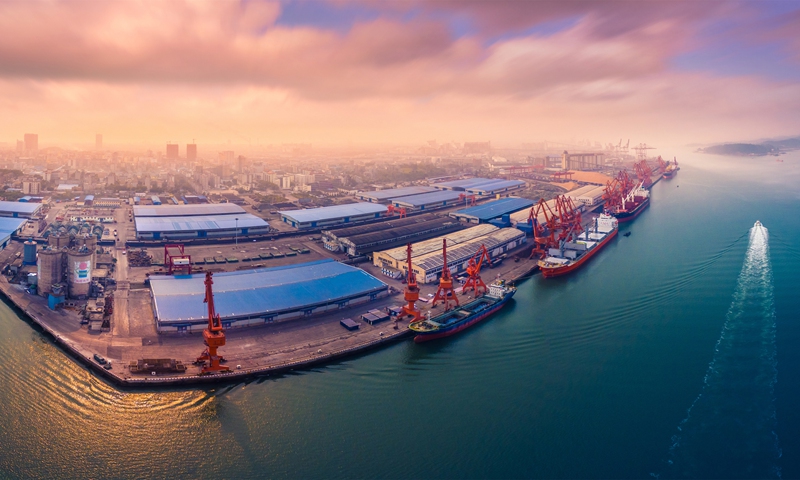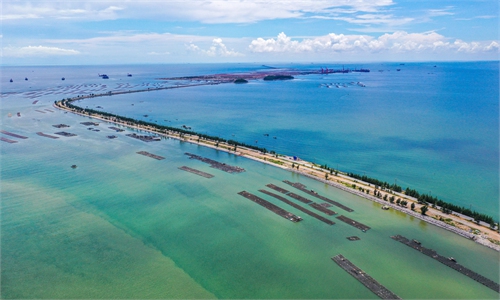China's latest delineation of territorial sea baseline in Beibu Gulf will not affect interests of any country: FM

The Fangcheng Port at Beibu Gulf in South China's Guangxi Zhuang Autonomous Region Photo: VCG
China's latest delineation of territorial sea baseline in Beibu Gulf will not impact Vietnam's interests or those of any other nation; on the contrary, it will help deepen international maritime cooperation between China and relevant countries, and foster development of the global maritime industry, the Chinese Foreign Ministry said on Monday.
The Chinese government issued a statement on Friday, regarding the baseline of the northern part of the Beibu Gulf in accordance with the Law on the Territorial Sea and Contiguous Zone promulgated in 1992.
According to the Department of Boundary and Ocean Affairs of the Chinese Foreign Ministry, the law promulgated in 1992 stipulates that China's baseline for the territorial sea is delineated using the method of straight baselines.
The department said on its official WeChat account that the announcement of the baseline of the territorial sea is a necessary act to exercise national sovereignty and jurisdiction. In addition, there are different management regulations and usage plans for internal waters, territorial seas and exclusive economic zones. Only by delineating the baseline of the territorial sea can the scope of the above-mentioned sea areas be clearly defined, and it provides a basis for the standardized and scientific use of the sea by coastal provinces and regions, the department noted.
The Department of Boundary and Ocean Affairs said the announcement of the baseline of the northern part of the Beibu Gulf is an important part of China's efforts to improve the delineation of the baseline of the territorial sea, aiming to serve the economic development of provinces and regions along the northern part of the Beibu Gulf such as Guangxi, Guangdong and Hainan, and to better serve the goal of building China into a maritime power.
The delineation of the baseline of the northern part of the Beibu Gulf strictly complies with domestic laws, international laws and bilateral agreements, the department added.
The delineation is in accordance with the Law on the Territorial Sea and Contiguous Zone. Besides, as China is a signatory to the United Nations Convention on the Law of the Sea, and that China and Vietnam signed an agreement on the delimitation of the territorial sea, exclusive economic zone, and continental shelf in the Beibu Gulf, the delineation followed relevant regulations.
Specifically, among the seven base points, Junbi Jiao was announced in 1996, and the first marking point of the demarcation line between China and Vietnam in the Beibu Gulf is determined according to the two countries' bilateral agreement, while the remaining five base points were selected in accordance with the United Nations Convention on the Law of the Sea.
The waters of the Beibu Gulf only involve China and Vietnam, the two coastal countries, and they delineated the boundary of the Beibu Gulf in 2000. China's delineation for its territorial sea on the Chinese side of the Beibu Gulf will not affect Vietnam's rights and interests, or those of any other nation, the Department of Boundary and Ocean Affairs emphasized.
On the contrary, clarifying the nature of the waters in the northern part of the Beibu Gulf will help China deepen international maritime cooperation with relevant countries, providing impetus for the development of the global maritime industry, the department said.
Experts noted that this delineation represents the second step in the three-step process of delineating China's territorial sea baseline, completing the delineation of all baselines located in the southern part of China, which is of great significance.
Global Times

